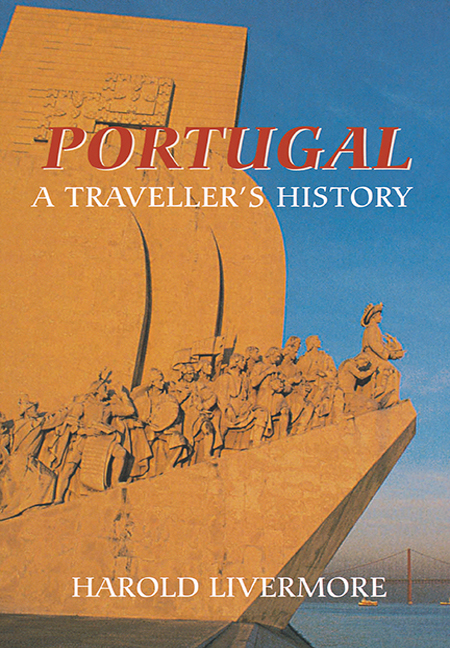Book contents
- Frontmatter
- Contents
- List of Illustrations
- Foreword
- 1 Introduction
- 2 Portugal in History
- 3 Before Portugal
- 4 Islamic Portugal
- 5 Architecture
- 6 Painting
- 7 Music
- 8 Birds
- 9 Fishing
- 10 Portuguese Wines
- 11 Lisbon
- 12 North from Lisbon
- 13 Oporto
- 14 North of Oporto
- 15 Interior Portugal
- 16 Alentejo
- 17 Algarve
- Afterword
- Index
- Frontmatter
- Contents
- List of Illustrations
- Foreword
- 1 Introduction
- 2 Portugal in History
- 3 Before Portugal
- 4 Islamic Portugal
- 5 Architecture
- 6 Painting
- 7 Music
- 8 Birds
- 9 Fishing
- 10 Portuguese Wines
- 11 Lisbon
- 12 North from Lisbon
- 13 Oporto
- 14 North of Oporto
- 15 Interior Portugal
- 16 Alentejo
- 17 Algarve
- Afterword
- Index
Summary
The sudden collapse of the Spanish Goths in ad 711 arose from their own dissensions and from the dynamic expansion of Islam, which had conquered Egypt in 642, been held for a time at Carthage, and then at a bound reached the Straits of Gibraltar, reducing Eastern Rome, the Byzantine Empire, to a shadow of itself. The Greeks had occupied North Africa for less than two centuries and had revived the western church both in Lusitania and in the Suevic kingdom of Braga. They had been driven out by the Goths before 615, but rarely regarded the rulers of the west as anything more than a barbarian division of the Roman army that had seized power and perpetuated itself. The Gothic kings of Toledo lived in some state, but they and their nobles were no better landlords than the absentee Roman senatorial order they had replaced, and were much closer at hand. A faction seeking to overthrow Roderic, ‘the last of the Goths’, sought aid from North Africa. The first invasion, of Berbers, killed Roderic and seized Toledo and its treasure: the second, of Arabs, occupied Seville and overcame the last resistance at Mérida. The two Muslim forces then joined and toured the provinces, receiving the capitulation of governors and counts: it is supposed that they reached Portugal and Galicia before being recalled to Damascus, but the evidence is slight. The caliph in Baghdad had not authorised a permanent occupation, and could hardly have envisaged that his successors would continue to govern in Portugal until about 1245, and in Spain until the fall of Granada in 1492. The difference is significant. We cannot expect to find an Alhambra or a Generalife in Portugal because the Christian Reconquest had been completed there before the Nasrid kingdom of Granada was founded. The only Portuguese province with an Arabic name is the Algarve. To northerners it is the deep south, but from an Arabic orientation it was the far west. The garb is the sunset and is also the name of Morocco, the Magrib.
At first, the invaders did not much care about the north-west, but thought of pursuing the conquest into Gaul. They formed a ‘military colony’, which made use of the Gothic faction that had brought them, but did not restore the monarchy. Many of the conquering Berbers returned to Africa.
- Type
- Chapter
- Information
- Portugal: A Traveller's History , pp. 45 - 49Publisher: Boydell & BrewerPrint publication year: 2004



